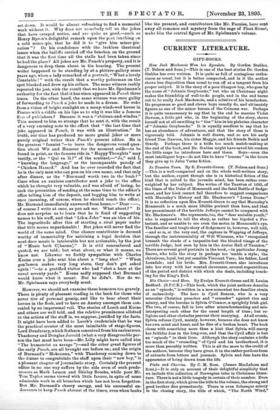In Taunton Town. By E. Everett-Green. (T. Nelson and Sons.)
—This is a well-compacted and on the whole well-written story, but the author, expert though she is in historical fiction of the kind that is suited to the juvenile mind, has been rather over- weighted by her subject. She writes of the Taunton of 1635, of the times of the Duke of Monmouth and the fatal Battle of Sedge- moor, and her book cannot fail therefore to suggest comparisons with Macaulay's History and Mr. Blackmore's "Lorna Dome." It is no reflection upon Mrs. Everett-Green to say that Macaulay's Monmouth is a much more lifelike portrait than hers, and that her presentment of the terrible Jeffreys cannot be compared with Mr. Blackmore's. She represents,too, the "dear amiable youth," who is supposed to tell the story, as rather too bigoted a Pro- testant, and as unable to see even the motes in Monmouth's eye. The familiar and tragic story of Sedgemoor is, however, well told, —and so is, at the very end, the capture in Wapping of Jeffreys, through the instrumentality of Will Wiseman, who "recognised beneath the shade of a tarpaulin-hat the bloated visage of the terrible Judge, last seen by him in the Assize Hall of Taunton." There are several good portraits in the book, —in particular Joung Snowe, who tells the story in perhaps too 'umble a style ; the chivalrous, loyal, but yet sensible Viscount Vere ; his father, Lord Lonsdale ; and his bride. Mrs. Everett-Green also introduces into her story with her wonted cleverness, several superstitions of the period and district with which she deals, including touch- ing for the King's Evil.










































 Previous page
Previous page